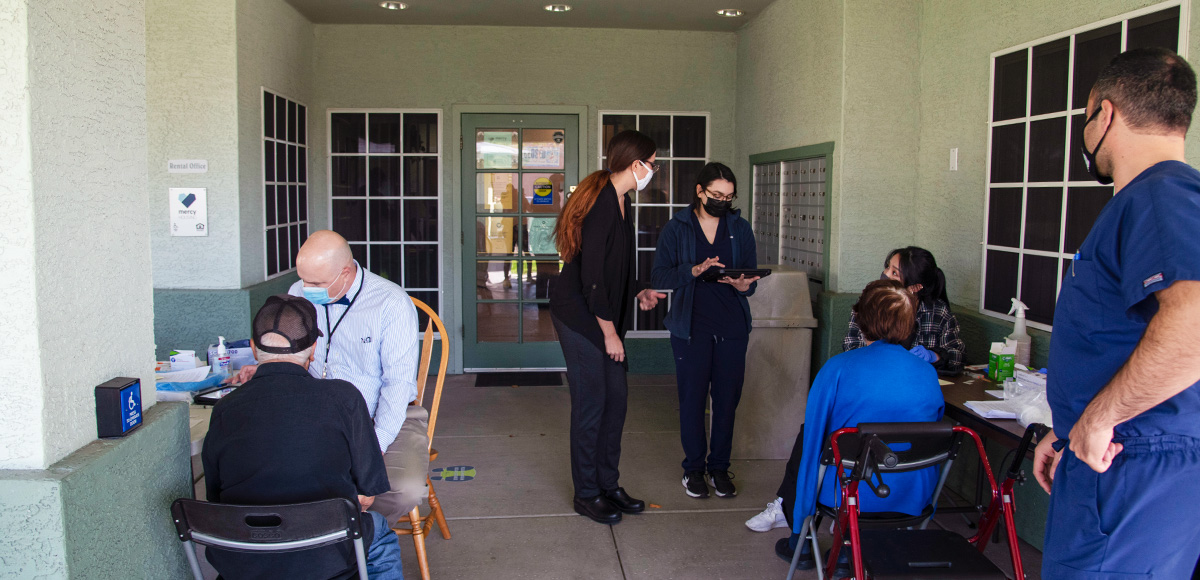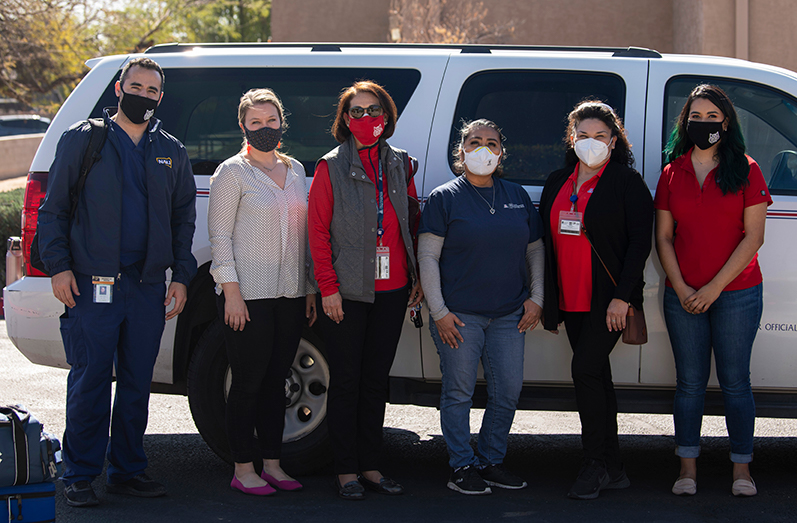Mobile Health Units Help Maricopa County Reach Underserved Communities with COVID Vaccinations

Staff and students from the University of Arizona Health Sciences – Phoenix delivered vaccines to residents of a senior public housing complex as part of a Mobile Health Units pilot vaccination program for Maricopa County.
In a push to make COVID vaccine distribution more equitable, the Mobile Health Units program has been contracted by Maricopa County to deliver the COVID vaccine to underserved populations and communities of color in metro Phoenix that do not otherwise have access.
The Mobile Health Units (MHU) program from the Phoenix Campus of the Mel and Enid Zuckerman College of Public Health, has been working successfully to improve public health by reaching out to underserved and Spanish-language communities since 2016. In a push for more equitable distribution of the COVID-19 vaccines, Marciopa County Department of Public Health (MCDPH) is contracting with the MHU program to distribute vaccine doses to the populations they serve, which are predominantly communities of color that have not previously had access to the vaccine.
Many adults in underserved communities do not have access to computers or email accounts, so they are unable to register and book vaccination appointments at the existing state and county Points of Dispensing (PODs) in Arizona. These same communities also may not have access to vehicles, and most PODs are currently drive-thru sites, which further limits access. Sometimes these populations are elderly and thus more susceptible to severe cases of COVID-19. Many in these underserved communities are also essential workers who must leave the house to pay the bills and face increased risk of exposure on the job.
Cecilia Rosales, MD, MS, Associate Dean of Community Engagement and Outreach – Phoenix Programs, from the Zuckerman College of Public Health – Phoenix Campus (COPH-P), and the founder of the Mobile Health Units program, sees the acute need to deliver COVID vaccines to communities that otherwise don’t have access. “The MHU’s already serve these hard-to-reach populations that urgently need the vaccine, they have relationships of trust, and so they are perfectly positioned to bring the vaccine to the people, to communities of color that don’t have the technology or transportation options required to get vaccinated by the existing PODs,“ said Dr. Rosales.
In collaboration with Maricopa County, the MHU team successfully implemented a pilot vaccine distribution program for seniors in a public housing complex last week. This pilot served to test the MHU’s registration and distribution process, and to train students to deliver the vaccine. Since the pandemic began, the MHU team has been reaching its clients by phone and text because in-person engagement is too risky. Following that approach, the MHU team calls participants in a target community prior to the delivery program and registers them over the phone, then travels to the community to give the vaccine shots on site.

The MHU team and support staff on the day of the distribution pilot. Left to right: Jeffery Hanna, Mackenzie Tewell, Dr. Cecilia Rosales, Alma Ramirez, Maria Jaime, and Maryell Martinez.
Lilliana Cardenas, AM (MSW), Manager of the Office of Community Empowerment, MCDPH, and Mackenzie Tewell, MA, MPH, CPH, Public Health Liaison, lead the project for Maricopa County. “We’re very encouraged to partner with the Mobile Health Units to reach our diverse and underserved communities that don’t have access to the COVID vaccine through the current registration and distribution platforms that other communities in Maricopa County use. This is an important first step in a long and collaborative effort. Following this successful pilot we look forward to expanding the program so we can reach more of our underserved communities throughout Maricopa County,” said Cardenas.
Several faculty, staff and students from University of Arizona Health Sciences participated in the pilot MHU vaccine distribution program on February 8, including participants from the Zuckerman College of Public Health – Phoenix Campus (COPH-P), the UArizona College of Medicine – Phoenix (COM-P), and the UArizona College of Pharmacy – Phoenix (COP). Dr. Rosales participated alongside MHU team members Jeffrey Hanna, Maria Jaime, Maryell Martinez, and Alma Ramirez. Dr. Jim Lundgren, Professor of Medicine, COM-P, helped to train students from COM-P and COP to deliver vaccine shots, including Bernice Alcanzo, Colton Crown, Alexis Montoya, and Lisa Wan. Nancy Alvarez, Associate Dean, Academic and Professional Affairs, COP, also supported the pilot alongside Dr. Nicole Henry, assistant professor, COP. Mackenzie Tewell from Maricopa County also joined to support the pilot program and see the county’s investment in action.
Moving forward, the MHUs will expand vaccine distribution to underserved communities in Maricopa County in order to bring greater equity to the distribution process. In particular, in close collaboration with Maricopa County Public Health officials, the MHU team will focus on communities that live in public housing and senior housing. In addition, the MHU team will reach neighborhoods where they have already established contacts in the community and work with non-profits that serve those communities in order to deliver vaccinations for individuals who are not able to access the vaccination PODs in the Phoenix metro for a variety of reasons.
All of us in the College of Public Health are deeply concerned about equity in vaccine distribution, and it is a challenge that has not been adequately addressed. Our faculty, staff, and students continue to work with state and county health authorities to find ways to reach those communities, often communities of color, with the vaccines in order to save lives and livelihoods.

